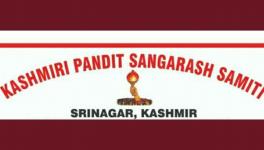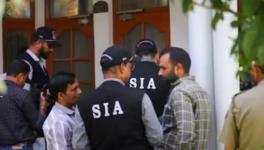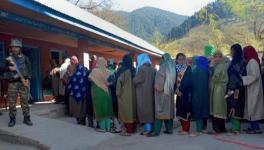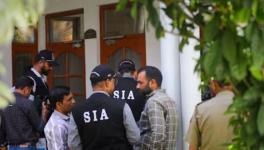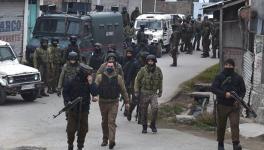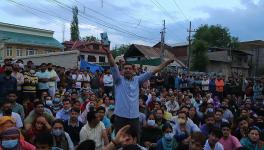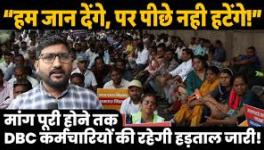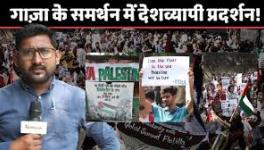Modi Used us For Political Gains, say Kashmiri Pandits
Image for representational use only; Image Courtesy : The Wire
Jammu: In 2018, when Rani Kaul’s daughter got married, she and her husband had to face embarrassment whenever guests showed up at their place, as her house was in a dilapidated condition. Water would be dripping from the ceiling, the new paint on the walls was peeling off. The kitchen floor was strewn with concrete spilled from cracks in the walls. The glass on windows was broken due to heavy wind. It seemed like an abandoned house. This in a nutshell is the state of one-room tenements provided to migrant Kashmiri Pandits who left the valley in 1989-90, when the militancy was at its peak.
“We had no space to accommodate guests. We were so terrified with the very idea of having guests over. Look at the condition of the house. My husband is unemployed. I am a housewife. We survive on relief money and ration. Governments come and go. No one has done anything for us,” Rani told Newsclick. She said she could not even think of inviting her son-in-law overnight because of space issues and discomfort.
Avtar Bhat said he feels unsettled and alienated even after 29 years have passed. Huddled in a one-room apartment are his six family members. Behind the seeming vigour and smile on his face are memories of the past that still linger. The words etched on the top panel of his door echo his longing. Written with white paint on the brown wooden panel is “Bhat’s (Anantnag)”. Anantnag is the name of district which was his original residence in Kashmir.
During 1989-90, when militancy was at its peak in the valley, a large number of Kashmiri Pandits, along with several Sikhs and Muslim families, fled the valley, fearing a threat to their lives. They left behind their houses and property. As quoted by The Hindu, out of 38,119 Kashmiri Pandits families, 24,202 came to Jammu and other areas. Nearly 200 Kashmiri Pandits were allegedly killed by militants. Currently, 808 families are residing in the valley, amounting to 3,445 people.
Bhat, a government employee, is now facing a new problem. Since the last one month, the amount of rice offered to government employees has been reduced. “We have been receiving 4 kg for the last one month. Earlier, we used to receive 9 kg of rice. Whenever we approached the Relief commissioner, his answer is that the order has come from the Centre. We have no idea about this order. I don’t earn much. It’s difficult to survive here,” Avtar told Newsclick. The families living at the Jagti and Nagrota settlements receive monthly relief of Rs 2,500 per person and ration, including 9 kg of rice, 2 kg of wheat and 1 kg of sugar.
Kashmir Pandits living in tenements are spending a life of misery and despair. Newsclick travelled to the Jagti and Nagtora settlements to get a closer look at the condition of Kashmiri Pandits as they complete the 29th year of exile, who are observing January 19 as a “holocaust day”. Most Kashmiri Pandits are angry with the current Bharatiya Janata Party (BJP)-led regime at the Centre. They said they had voted for BJP with the hope that their voices would heard. But now they feel that the party had used them for their own political propaganda.
“Modi (Prime Minister Narendra Modi) used Kashmiri Pandits and discarded us. We voted Modi enthusiastically hoping that we will be rehabilitated, but lately we have realised that we were used as a counter-narrative to the dominant Kashmiri narrative and create sympathy. We don’t need sympathy. Look at the condition of our houses. We had a huge house in Kashmir. Here, five people live in a single-room apartment. Not a single BJP member has come to meet us to hear our grievances. They used us for political gains to keep the Hindutva narrative going,” said Shadi Lal Kaul, President, Jagti Township.
The BJP’s 2014 Lok Sabha election manifesto underlined the “return of Kashmiri Pandits to the land of their ancestors with full dignity, security and assured livelihood.” As the party is close to completing its term, the overwhelming support given by the Kashmiri Pandits seems to be wearing off.
“BJP has failed us. Forget everything else, they couldn’t even improve the conditions of our settlements. Whenever elections are close, there will be a whataboutery,” said Roop Kaul from Nagrota settlement, flanked by his mother who interrupted and said, “Panun watan gav panuni. Tatye aaus maaz. Yetnas tchas bas doh ganzravan (Motherland is motherland. It was good in Kashmir. Here I am counting my days.)
Jagti Township, 20 kilometers away from Jammu city was established in 2011 and is home to nearly 4,220 Kashmiri Pandit families, consisting of over 20,000 persons. Many people living in Jagti complained about poor hospital facilities and unavailability of medicines. “Doctors are present only on a few days, the other days there is no one. Medicines are not available. We have to go to Jammu to get medicines. The conditions haven’t improved. It is supposed to be a 24x7 hospital but there is rarely a doctor during the night hours. The area is disconnected from Jammu city. So, we have to travel far to receive medical care,” said Shadi Lal Kaul.
In July, 2017, the Supreme Court rejected a plea for a probe into the killings of Kashmiri Pandits saying “it was too late.” “27 years have gone by. Where will the evidence come from,” the court had observed. However, in a separate case, the cases of anti-Sikh riot was taken up. The court’s observation had created general disgruntlement among Kashmiri Pandits who expected the BJP government to weigh on the court an pursue the case.
Chandar Rani summed up the general discontentment of Kashmiri Pandits, saying: “Kyah Modi te Kyah Congress, aese kahter tche saeri hivye (What Modi? What Congress? For us, everyone is the same.)”
Get the latest reports & analysis with people's perspective on Protests, movements & deep analytical videos, discussions of the current affairs in your Telegram app. Subscribe to NewsClick's Telegram channel & get Real-Time updates on stories, as they get published on our website.










